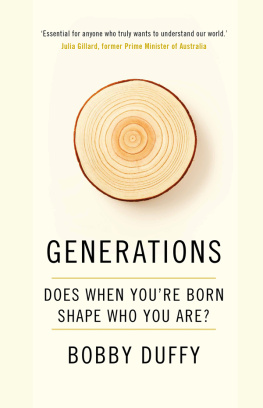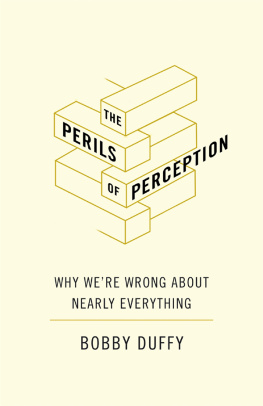Bobby Duffy - Generations
Here you can read online Bobby Duffy - Generations full text of the book (entire story) in english for free. Download pdf and epub, get meaning, cover and reviews about this ebook. year: 2021, publisher: Atlantic Books, genre: Politics. Description of the work, (preface) as well as reviews are available. Best literature library LitArk.com created for fans of good reading and offers a wide selection of genres:
Romance novel
Science fiction
Adventure
Detective
Science
History
Home and family
Prose
Art
Politics
Computer
Non-fiction
Religion
Business
Children
Humor
Choose a favorite category and find really read worthwhile books. Enjoy immersion in the world of imagination, feel the emotions of the characters or learn something new for yourself, make an fascinating discovery.
- Book:Generations
- Author:
- Publisher:Atlantic Books
- Genre:
- Year:2021
- Rating:5 / 5
- Favourites:Add to favourites
- Your mark:
- 100
- 1
- 2
- 3
- 4
- 5
Generations: summary, description and annotation
We offer to read an annotation, description, summary or preface (depends on what the author of the book "Generations" wrote himself). If you haven't found the necessary information about the book — write in the comments, we will try to find it.
Generations — read online for free the complete book (whole text) full work
Below is the text of the book, divided by pages. System saving the place of the last page read, allows you to conveniently read the book "Generations" online for free, without having to search again every time where you left off. Put a bookmark, and you can go to the page where you finished reading at any time.
Font size:
Interval:
Bookmark:

Brilliant. Duffy has built a powerful toolkit for understanding the forces and relationships that shape the world we live in and the one our children will inherit.
Rafael Behr, Guardian columnist
The most comprehensive, compelling and careful account for how and why the generations diverge, come together and can better connect.
Danny Dorling, Professor of Geography, Oxford University
A truly brilliant and engaging explanation of a new way to think about how and why were changing. Duffy picks clever and often amusing examples to illustrate his analysis, while he also recognises the important concerns we all have about the future and our place in it.
Dame Louise Casey, former Director General of the
Department for Communities and Local Government
This important book deserves our attention. Duffy casts new light on the endlessly fascinating issue of what links the generations and how they differ.
Lord David Willetts, author of The Pinch
Bobby Duffy is Director of The Policy Institute at Kings College London and Professor of Public Policy. Formerly Global Director of Ipsos Social Research Institute, he has also been seconded to the British Prime Ministers Strategy Unit and to the Centre for Analysis of Social Exclusion (CASE) at the London School of Economics. He is the author of The Perils of Perception: Why Were Wrong About Nearly Everything.
DOES WHEN YOURE BORN
SHAPE WHO YOU ARE?
Bobby Duffy

Published in hardback and trade paperback in Great Britain in 2021 by
Atlantic Books, an imprint of Atlantic Books Ltd.
Copyright Bobby Duffy, 2021
The moral right of Bobby Duffy to be identified as the author of this work has been asserted by him in accordance with the Copyright, Designs and Patents Act of 1988.
All rights reserved. No part of this publication may be reproduced, stored in a retrieval system, or transmitted in any form or by any means, electronic, mechanical, photocopying, recording, or otherwise, without the prior permission of both the copyright owner and the above publisher of this book.
Every effort has been made to trace or contact all copyright holders.
The publishers will be pleased to make good any omissions or rectify any mistakes brought to their attention at the earliest opportunity.
10 9 8 7 6 5 4 3 2 1
A CIP catalogue record for this book is available from the British Library.
Hardback ISBN: 978 1 78649 972 1
Trade paperback ISBN: 978 1 83895 260 0
E-book ISBN: 978 1 78649 974 5
Design, graphs and typesetting benstudios.co.uk
Printed in Great Britain
Atlantic Books
An imprint of Atlantic Books Ltd
Ormond House
2627 Boswell Street
London
WC1N 3JZ
www.atlantic-books.co.uk
For Jimmy, Birdie, Bobby, Mary, Jim, Anne, Jim,
Louise, Bridget and Martha four generations of
my family who will see 200 years of history
W e are teetering on the brink of a generational war. Wherever you look, battles and betrayals across the generations are poisoning relations between old and young. Older people have stolen the future from younger generations, while the young are killing the traditions that older generations hold dear. Emerging social justice warriors find themselves facing a war on woke. Baby Boomers are selfish sociopaths, while Millennials are narcissistic snowflakes.
This, at least, is the endlessly repeated story. But is any of it true?
I began the research that would inspire this book with the intention of separating the myths about different generations from the reality. We seem to intuitively grasp that the concept of generations helps us understand something important about who we are and where we are headed. However, much of what passes as discussion on the topic is based on stereotype and lazy thinking, making it useless or even dangerous. My argument is that, while we can learn something very valuable about ourselves by studying generational dynamics, we will not learn anything from a mixture of fabricated battles and tiresome clichs. Instead, we need to carefully unpick the forces that shape us as individuals and societies; the generation we were born into is merely one important part of the story, alongside the extraordinary power of our lifecycles and the impact of events.
More systematic generational thinking, and the long-term perspective it encourages, will show that the real problem isnt warfare between generations but a growing separation between the young and the old. It will show us that peoples resentments of other generations are more to do with the changing nature of economic, housing and health inequalities. It will explain how and why our culture is changing, particularly on key issues such as race and gender identity. And it will help us to see how support for political parties is shifting, and to understand whether democracy is really dying. It can tell us a great deal about many of the biggest issues humanity faces, from climate change to our mental health.
Ultimately, it will show that the social progress weve come to expect as an inevitable feature of new generations is actually far from inevitable. It is the product of collective intergenerational will, a dedicated desire to protect the opportunities that mean a better future for our children and grandchildren. Instead, their future looks increasingly under threat.
* *
The COVID-19 pandemic has only increased the urgency of this type of generational perspective, not least because the virus itself and the measures that have been introduced to control it have affected different generations in extraordinarily different ways.
Most obviously, the immediate health threat was hugely dependent on your age. For those born at the start of the Second World War or earlier, without vaccinations in play, there was a one in twenty chance of dying if you caught the virus. At the other end of the age spectrum, the probability of dying was vanishingly low. The risk of death doubled with every eight years of age, a generational example of the gruesome exponential curves weve learned to dread during the pandemic.
But what really surprised people was the level of solidarity between generations. The overall picture, across countries and age groups, was of incredible compliance with extraordinary measures imposed mainly to protect older generations.
This lack of rebellion from younger generations was despite the fact that they were the ones experiencing the greatest negative economic and educational impacts from lockdown. In the UK, for example, young people are two and a half times as likely to work in the sectors most affected by social distancing measures, such as hospitality. This is an incredible misfortune for younger generations, already disproportionately affected by the 2008 financial crisis which was previously considered our era-defining economic event. This enormous global recession had already stalled or reversed economic progress for a generation of young people in very many Western countries.
A pandemic where the disease disproportionately affects the old and protective measures disproportionately affect the young seems almost designed to fracture intergenerational ties. But we are only surprised at the real outcome because we have been so conditioned to view generations as opposed factions.
Font size:
Interval:
Bookmark:
Similar books «Generations»
Look at similar books to Generations. We have selected literature similar in name and meaning in the hope of providing readers with more options to find new, interesting, not yet read works.
Discussion, reviews of the book Generations and just readers' own opinions. Leave your comments, write what you think about the work, its meaning or the main characters. Specify what exactly you liked and what you didn't like, and why you think so.











